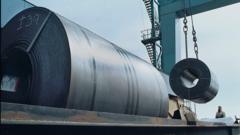In a bold move aimed at safeguarding the American steel industry, President Donald Trump has enacted an order that doubles tariffs on steel and aluminium imports from 25% to a staggering 50%. Set to begin on Wednesday, this announcement marks the second considerable increase in tariffs since March, reflecting the administration's long-standing focus on protecting key industries deemed vital for national security.
US Increases Steel and Aluminium Tariffs to 50% Amidst Trade Tensions

US Increases Steel and Aluminium Tariffs to 50% Amidst Trade Tensions
The recent hike in tariffs is poised to impact both domestic manufacturers and international trade relations.
Supporters of the measure argue that it will ensure the future of the domestic steel industry, but critics warn of potentially severe repercussions for both foreign steel producers and American companies dependent on these metals. The immediate reaction from many affected firms has been one of disbelief, with hopes that the actions would merely be a temporary phase or a bargaining tactic.
Trump's decision includes an exception for the UK, which will remain at the original 25% tariff level, reflecting ongoing trade negotiations between the two countries. Rick Huether, CEO of Independent Can Co. based in Maryland, expressed concerns over the instability brought by these abrupt shifts, highlighting fears that rising costs will drive customers to seek alternatives to steel packaging.
Currently, the US stands as the world’s largest steel importer, second only to the European Union, receiving a significant amount from Canada, Brazil, Mexico, and South Korea. Historically, tariffs of 25% on steel and 10% on aluminium have been enacted during Trump's presidency, using authority granted through legislation aimed at safeguarding national security.
Despite earlier exemptions on certain imports having been withdrawn in March, the true fallout from these latest tariffs remains uncertain. Notably, steel imports had already decreased by 17% as of April, an indication of the market's volatility in response to previous increases.
Additionally, concerns are brewing in Europe and Canada, where retaliatory tariffs on American products are being prepared in response to Trump’s measures. European Commission spokesperson Olof Gill articulated the ongoing negotiations with the US, emphasizing hopes for a resolution that would alleviate some of the tensions.
In the UK, officials are feeling the pressure to finalize trade agreements that could lessen the impact of the revisions on local steel exporters. Jonathan Reynolds, the UK Trade Secretary, welcomed the preservation of the lower tariffs while asserting ongoing efforts to negotiate improvements to their trade relationship with the US.
However, experts are warning that the economic disruptions caused by these tariffs could outweigh any intended benefits. Reported estimates predict the loss of 75,000 jobs across various sectors due to elevated production costs linked to these tariffs. Erica York from the Tax Foundation pointed out the risks associated with tariffs on intermediate goods like steel and aluminium, predicting heavier job losses in this latest round.
Small manufacturers like Chad Bartusek, whose business relies heavily on imported steel, are grappling with the financial burden created by the new duties. With expected increases in tariff costs, some are already experiencing caution from customers, leading to cuts in worker hours and financial instability.
As American businesses navigate these uncharted waters, there is growing hope that swift resolution can mitigate the adverse effects of the tariffs and restore stability to the steel and aluminium markets.
Trump's decision includes an exception for the UK, which will remain at the original 25% tariff level, reflecting ongoing trade negotiations between the two countries. Rick Huether, CEO of Independent Can Co. based in Maryland, expressed concerns over the instability brought by these abrupt shifts, highlighting fears that rising costs will drive customers to seek alternatives to steel packaging.
Currently, the US stands as the world’s largest steel importer, second only to the European Union, receiving a significant amount from Canada, Brazil, Mexico, and South Korea. Historically, tariffs of 25% on steel and 10% on aluminium have been enacted during Trump's presidency, using authority granted through legislation aimed at safeguarding national security.
Despite earlier exemptions on certain imports having been withdrawn in March, the true fallout from these latest tariffs remains uncertain. Notably, steel imports had already decreased by 17% as of April, an indication of the market's volatility in response to previous increases.
Additionally, concerns are brewing in Europe and Canada, where retaliatory tariffs on American products are being prepared in response to Trump’s measures. European Commission spokesperson Olof Gill articulated the ongoing negotiations with the US, emphasizing hopes for a resolution that would alleviate some of the tensions.
In the UK, officials are feeling the pressure to finalize trade agreements that could lessen the impact of the revisions on local steel exporters. Jonathan Reynolds, the UK Trade Secretary, welcomed the preservation of the lower tariffs while asserting ongoing efforts to negotiate improvements to their trade relationship with the US.
However, experts are warning that the economic disruptions caused by these tariffs could outweigh any intended benefits. Reported estimates predict the loss of 75,000 jobs across various sectors due to elevated production costs linked to these tariffs. Erica York from the Tax Foundation pointed out the risks associated with tariffs on intermediate goods like steel and aluminium, predicting heavier job losses in this latest round.
Small manufacturers like Chad Bartusek, whose business relies heavily on imported steel, are grappling with the financial burden created by the new duties. With expected increases in tariff costs, some are already experiencing caution from customers, leading to cuts in worker hours and financial instability.
As American businesses navigate these uncharted waters, there is growing hope that swift resolution can mitigate the adverse effects of the tariffs and restore stability to the steel and aluminium markets.





















